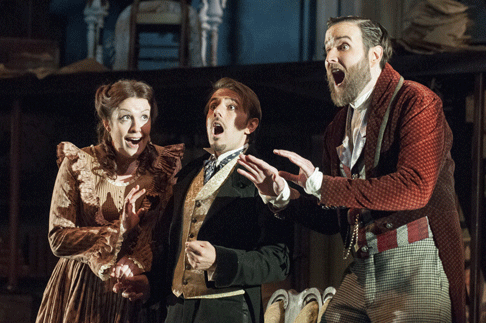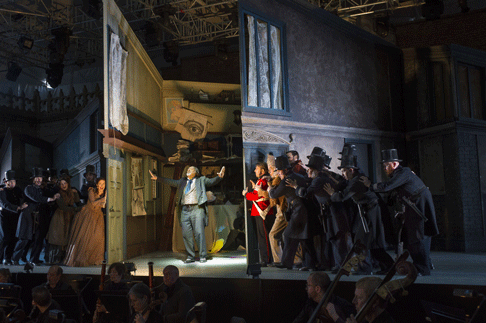Into the greys and browns of a Dickensian street — all gas-lights,
Peelers, down-and-outs and street urchins — juts the sharply angled exterior
of Dr Bartolo’s abode (designs, Neil Irish). From an archway emerges a
staggering drunk; he droops against a lamp-post and, annoyed at being awoken by
a motley band of musicians, stubbornly sticks his fingers in his ears as the
incognito Count Almaviva’s delivers an amorous address to his beloved Rosina.
She lingers, tantalisingly glimpsed through the askew — and none too clean
— white curtains of the upper-floor bedroom which overhangs the street.
The set intrudes into the fore of the stage, and there is not much room for
ensemble choreography; but, this matters little as Platt doesn’t really ask
them to do anything other than take their positions and sing — they do the
latter very pleasingly. At the start of Scene 2 the oblique walls are heaved
open to reveal the mayhem of the scatter-brained doctor’s daily routines, as
professionalism and domesticity collide. The split-level house is a mound of
muddle: tottering piles of consultation notes and scientific research, optical
charts, crumbling treatises. Above Rosina’s dressing table a large drawing of
an anatomical eye glares out forbiddingly. Amid the general chaos lurks some
unsavoury medical debris — as the pandemonium escalates a severed hand is
flung in the street attracting the suspicious attentions of first a ragamuffin
and then the metropolitan constabulary — suggesting that the old governess
Berta is past her housekeeping prime.
 Kitty Whately as Rosina, Nico Darmanin as Count Almaviva and Nicholas Lester as Figaro
Kitty Whately as Rosina, Nico Darmanin as Count Almaviva and Nicholas Lester as Figaro
It’s all detailed and precise. And, the simultaneous view of interior and
exterior is effective: quotidian life — washing day, bobbies on the beat —
forms a commonplace backdrop to the mad capers within. As the self-indulgent
lovers ignore Figaro’s advice to flee, we witness Bartolo’s removal of the
ladder which they confidently assume will facilitate their escape — a neat
touch of dramatic irony. Mark Jonathan’s lighting design is fairly simple and
naturalistic, excepting a lurch towards the surreal at the end of Act 1 where,
surrounding a spot-lit Bartolo, the plotters bathe in lurid green and pink
aptly emphasising the wackiness of the comic commotion.
Design and direction may not surprise, but the cast certainly tell the tale
with musical aplomb. Australian baritone Nicholas Lester has a large, opulent
voice which he put to excellent effect as the quick-thinking barber. His
bass-inclined resonance grabbed the attention from his first entrance. Pushing
a stripy-poled hand-cart, this Figaro peddled his talents and wares — some
wild wigs dangle from his wagon — with confidence and composure, a nonchalant
single swipe of the razor de-whiskering a client during ‘Largo al
factotum’. Lester’s lines were clearly formed, of pleasing tone, and his
performance was well-paced. His on-stage presence ensured that the uproar never
lapsed into anarchy, and when a commanding hand was required he assuredly
stepped in.
As the wayward young minx, Rosina, Kitty Whately was likewise superb.
Whately’s mezzo has a lovely golden glow at the bottom reminding us, perhaps,
that the role was originally written for a contralto. Her lustrous tone
projected well, beguiling all; but, this Rosina’s potential for menace was
plainly evident, as Whately stropped and pouted in frustration and
exasperation. The coloratura of ‘Una voce poco fa’ was cleanly executed, as
Rosina turned her indignation on the hapless skeleton collecting dust amid the
clutter; Platt might have offered Whately more direction here — she looked a
bit uncertain why she was draping the bones with Bartolo’s overcoat — but
her comic acumen shone through in the singing lesson.
 A scene from Il barbiere di Siviglia
A scene from Il barbiere di Siviglia
Young Maltese tenor Nico Darmanin was an ardent Almaviva and slipped deftly
between his varied personae. Lindoro’s velvet frock coat added a splash of
colour to the opening scene but I felt that initially Darmanin tried a bit too
hard — he has all the notes and a strong, unwavering tone, but perhaps a
softer hue would more readily win Rosina’s heart. But, as Darmanin relaxed
into the role his sure technique served him well and the decorative lines were
stylishly phrased. The tenor also revealed a penchant for comic exaggeration,
as the inebriated cavalry-man determined to be billeted chez Bartolo, and even
more so as Basilio’s apprentice, cleverly mimicking his master’s mannerisms
and his sartorial style. The piano-top shenanigans of Rosina and the Count,
under Figaro’s impatient glower, offered playful high-spirits and
characterful singing.
As the unfortunate dupe, Jonathan Veira showed why he deserves his
reputation as one of the best buffo basses today, making Bartolo the butt of
our ridicule but also winning sympathy for the befuddled, bamboozled buffoon.
With William Robert Allenby indisposed, Nicholas Crawley added Basilio’s
outré peri-winkle — straight from Pickwick Papers — to
Fiorello’s bowler hat, performing both roles excellently and with fine-judged
parody. As Berta, Alinka Kozari revealed a bright, nimble soprano, and as she
went doggedly about the household chores she was well complemented by Tom
Asher’s Ambrogio.
Conductor Matthew Waldren led the City of London Sinfonia through a sparking
overture, but from then on things were rather more conservative. Although there
was much attention to detail, it felt a bit too earnest; the string ensemble
was good and the woodwind and horn solos sang warmly, but the ‘Rossini
Rockets’ needed a bit more oomph. Walden’s tempi erred on the side of
caution and a greater sense of recklessness, particularly in Act 2 finale, would have added some spice. Perhaps he wished to
support his young cast, but there was certainly no sense that they needed
cossetting. The thunderstorm was disappointing, and the over-amplification of
the digital piano in the recitatives was irritatingly distracting.
Overall this is a smashing Il barbiere: no nasty surprises and
plenty of fun. There may be pressure on finances — Irish’s set is all
wobbly walls and bendy lampposts — but there is no scrimping on musical
values.
Il barbiere di Siviglia continues in repertory until 28 June.
Claire Seymour
Cast and production information:
Figaro, Nicholas Lester; Rosina, Kitty Whately; Count, Almaviva Nico
Darmanin; Doctor Bartolo, Jonathan Veira; Don Basilio, Nicholas Crawley; Berta,
Alinka Kozari; Fiorello, Nicholas Crawley; Ambrogio, Tom Asher; An Officer,
Alistair Sutherland; Director. Oliver Platt; Conductor, Matthew Waldren;
Designer, Neil Irish; Lighting Designer, Mark Jonathan; City of London
Sinfonia; Opera Holland Park Chorus. Opera Holland Park, London, Saturday
7th June 2014.
![Kitty Whately as Rosina and Jonathan Veira as Dr Bartolo [Photo by Fritz Curzon]](http://www.operatoday.com/Barber-3.gif)

